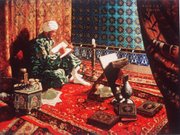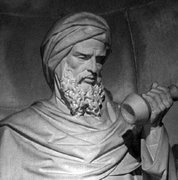By: Alfina Hidayah HM
Preface
According to Concise Oxford English dictionary the term 'Hinduism' means a major religious and cultural tradition of the Indian subcontinent, including belief in reincarnation and the worship of a large pantheon of deities.[1] This religion develops and expands to a number of countries in the world, and Indonesia is one of them where Hinduism has existed and continues to survive with other religious communities.
The expansion of Hindu in Indonesia started when the native people of the archipelago went to India for trade; the Indians reciprocated in the beginning of first millennium. As more and more Indians started settling in the archipelago, their influence started increasing. Over the islands; so much so that many Hindu kingdoms were founded in Java and have affected the Indonesian society and its customs.[2]
After the advent of Islam in the 11th century, the religion and beliefs of a majority of the people became Islam which continues to this day. However, one notice that even with the gradual downfall of the Hindu kingdoms one can still find their strong and perhaps increasing influence in the environment and community in contemporary Indonesia. Most of them inhabit the Hindu island of Bali, where the entire population is Hindu with an approximate percentage of 93% of the settled citizens.
Hinduism in Bali Indonesia has many rituals which have influence the society particularly the Muslims’ society. Since their ancestors were adherent of Animism who believed in a supernatural power that organizes and animates the material universe. Subsequently the Hindus of Indonesia also adopted the animistic as well as their original beliefs and practices. Unfortunately, traditional Javanese Muslims also practice those rituals of Animism and Hindu. These kinds are a mixture of religion and indigenous cultures.
Introductory Statement
The project will undertake to answer the questions “what is the impact of Hindu rituals and practices upon the Muslim community of Bali. These questions are:
1. How do Hindu kingdoms develop and rule the ancient archipelago in the history of Indonesia? (development of ancient Hindu in Indonesia)
2. The classical Hindu in Indonesia is a mixture of Hindu and Buddha as a single religion, why?
3. When we look at the contemporary Indonesia, we will find that Hindu make an effort to revive as one religion and separate from Buddhism, this revival what they called by Parisada Hindu Dharma. What are their aims for that?
4. What are their rituals which still present until today?
5. Bali is known as gods island (Devata Island), is Hindu and its rituals the main reason that promote Bali into well-known and became rich tourism island today?
6. Why is a Balinese Hindu more concerned with the rituals and art than beliefs, laws etc?
7. What is the impact of Hindu rituals on the society especially upon the Muslims?
8. Why the Muslims adopt and adapt the Hindu rituals? What are their purposes?
9. What is our position and statement as Muslims concerning this issue?
Methodology of Research
This project will try to answer the above questions through a historical study and a brief introduction of Hinduism in Indonesia all over its various periods. Secondly will mention some of their main rituals and ceremonies practices in detail to understand which are related to and adopted by Muslims. Finally I will come up to the contemporary issues between Hindu and Islam which relate to this topic followed by approaching to the conclusion that being a Muslim what we are going to do then.
Outline
I divided my topic as below:
ü A brief introduction to the historical background of Hinduism in Indonesian Archipelago
ü Chapter one: The rituals and ceremonies
ü Chapter two: Its impact on Muslim society
ü Conclusion
ü References
Some references arranged for project
Concise Oxford English Dictionary (Eleventh edition)
Hinduism in Indonesia-wikipedia, the free Encyclopaedia
Radhakrishnan, S. The Hindu Dharma. (International Journal of Ethics, Vol. 33, No. 1, (Oct., 1922), pp. 1-22). The University of Chicago Press
Schiller, Anne. An "Old" Religion in "New Order" Indonesia: Notes on Ethnicity and Religious Affiliation. (Sociology of Religion, Vol. 57, No. 4, (Winter, 1996), pp. 409-417). Association for the Sociology of Religion, Inc.
Shihab, Alwi. Membendung Arus, Respons gerakan Muhammadiyah terhadap penetrasi misi Kristen di Indonesia. (The Muhammadiyah movement and its controversy with Christian mission in Indonesia). Mizan, Bandung Indonesia, 1998
Shihab, Alwi. Islam Sufistik. Mizan, Bandung-Indonesia, 2001.
Van der Kroef, Justus M. The Hinduization of Indonesia Reconsidered (The Far Eastern Quarterly), Vol. 11, No. 1, (Nov., 1951), pp. 17-30. Association for Asian Studies.
[1] Concise Oxford English Dictionary (Eleventh edition).
[2] Shihab, Alwi. Membendung Arus, Respons gerakan Muhammadiyah terhadap penetrasi misi Kristen di Indonesia. (The Muhammadiyah movement and its controversy with Christian mission in Indonesia). Mizan, Bandung Indonesia, 1998. P.1.




No comments:
Post a Comment